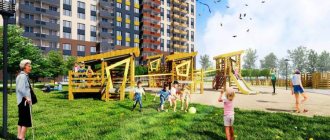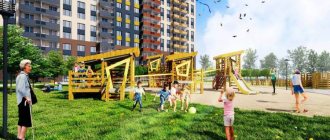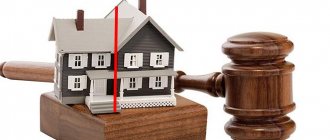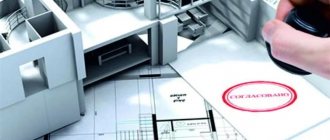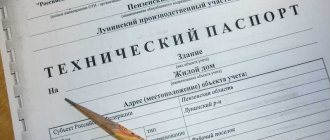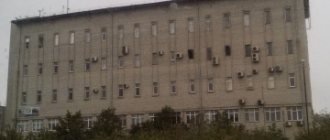The abbreviation MKD is deciphered as follows - apartment building. According to the law established by the state, a house built on private territory is considered multi-apartment if several apartments are combined into a single building, with a common territory and communications.
Such a building does not belong to an individual citizen, but is registered in the name of a group of owners. Owners can be:
- legal entities;
- municipal services;
- individuals.
General infrastructure includes:
- heating system;
- water pipes;
- gas pipeline;
- fire hydrants;
- security systems.
MKD - what is it, according to the Housing Code of the Russian Federation
The Housing Code of the Russian Federation was adopted in 2004 in accordance with Federal Law No. 188-FZ of December 29, 2004.
MKD is an abbreviated name for an “apartment building”, which presupposes the presence of a collection of several residential premises (apartments) that have common premises for non-residential purposes or overlook a common area limited by a certain land plot.
For your information! A distinctive feature of an apartment building is the presence of several owners, which can be individuals and legal entities, as well as government agencies.
Issues related to the common property of owners in an apartment building, as well as questions about the general meeting, are reflected in Chapter 6 of the Housing Code of the Russian Federation “Common property of owners of premises in an apartment building. General meeting of such owners.”
Composition of common property in an apartment building
MKD: decoding
To choose the correct interpretation, the first thing you need to pay attention to is the context in which the letter combination is used. And the abbreviation has quite a lot of decodings:
- Myocardial dystrophy (medical term).
- Urolithiasis (kidney disease).
- Pendulum cable car.
- Momentum.
- Cyrillic national domain of the state of Macedonia (.мкд).
- Moscow-Kursk road (railway connection).
- Megacandela (MCd) is the name given to the unit of measurement for the speed of light.
- Municipal Cossack squads.
- Intercasing pressure (energy, oil industry).
- Discipline “International commercial business”.
- International communist movements.
- “Marketing, consulting and design” (in the names of St. Petersburg and ZAO MKD).
- Muslim Action Committee (political party, Mauritius).
- International Club of Directors (Industrial Enterprises). Previously - the All-Union Club of Directors.
There are similar abbreviations in Latin (MKD):
- Macedonian dollar code.
- Video game "Mortal Kombat: Deception".
- Directorate of Military Channels in Germany (Militär-Kanal-Direktion).
And finally, deciphering the MKD in housing and communal services - an apartment building. We will devote the rest of the article to her.
Main characteristics of an apartment building
The main characteristics of an apartment building include the following parameters:
- location address;
- year of construction;
- number of the standard series or individual project on the basis of which construction was carried out;
- type of house and presence of built-in and attached premises;
- number of storeys;
- number of entrances;
- availability and number of elevators;
- number of residential and non-residential premises;
- total area with breakdown by type of available premises;
- cadastral number of the land plot on which the house is located;
- the area of the land plot included in the common property of the homeowners;
- parking area, if any, within the boundaries of the land plot;
- documents recognizing the house as unsafe, if any;
- energy efficiency class, in case of an energy audit of the building;
- additional information of a different nature.
Conducting an energy audit of residential buildings is an optional activity, but the results of its implementation can significantly reduce the costs of general household needs associated with the use of energy resources
The main characteristics of the apartment building must be reflected in the Appendix to the Apartment Building Management Agreement. In addition to the above items, the specified Appendix must reflect information about the elements of improvement of the local area, as well as the boundaries of the operational responsibility of the Management Company and energy supply organizations.
What is the difference between an apartment building and a private house?
The main difference between a private and apartment building is the object of ownership.
If in a private house, according to this criterion, the object of law is the house itself, then for MKD the object of law is individual apartments.
For your information! For a private house with several owners, the object of law, however, is the building itself, which in this case is in shared ownership.
The differences between an apartment building and a private building are determined by the following parameters:
- presence of owner (owners) of the property;
- the presence of common property that is in shared ownership;
- house management system and the presence of special bodies that carry out this process;
- the presence of components of a residential building under different forms of ownership.
A town house looks like a private house, but... the owners have a common plot of land, then this type of building belongs to the category of apartment buildings
In simple terms, the differences can be formulated differently, namely:
- a residential building is divided into rooms, and apartment buildings into apartments;
- in an apartment building there is shared ownership, but in a private house there is no;
- management of a private house is carried out by the owner, and in an apartment building - by a meeting of rights holders of residential premises.
What premises are included in the apartment building?
In accordance with the Housing Code of the Russian Federation, premises located in common shared ownership in an apartment building include:
- Premises that are not parts of apartments and serve to service several real estate objects (staircases and landings, elevators, corridors and technical floors, basements, etc.).
- Premises serving for social and cultural events and general recreation areas for homeowners.
- Building structures (roof, walls, etc.), as well as engineering communications that serve to provide real estate with energy resources (water supply and sewerage networks, heat supply and electricity).
- A plot of land on which the apartment building and the adjacent area are located in accordance with the cadastral plan.
Scheme of distribution of common property of apartment buildings
New in blogs
Differences between an apartment building and a privatized apartment as an object of law.
In my opinion, one of the fundamental topics for discussion!
Terms, concepts, definitions (mkd, apartment, etc.):
- “ RESIDENTIAL BUILDING - a separate structure ( building, house ) of a permanent type, designed for a long service life, all or at least half of the area of which is intended and used for living. According to the internal design, housings differ. apartment type or corridor type. "(Legal encyclopedia. 2015)
- “3.21 apartment building : Completed construction and put into operation properly, a capital construction object , which is a volumetric building structure , having above-ground and underground parts, including in-house engineering and technical support systems, common areas that are not parts of apartments, other premises in this house that do not belong to individual owners and residential premises intended for permanent residence of two or more families, having independent access to common areas in such a house (with the exception of semi-detached buildings); An apartment building includes built-in and (or) attached non-residential premises, as well as a local area (land plot). "( GOST R 51929-2014 Housing and communal services and management of apartment buildings. Terms and definitions. )
- “6. An apartment building is a set of two or more apartments having independent access either to a land plot adjacent to a residential building or to common areas in such a building. An apartment building contains elements of the common property of the owners of premises in such a building in accordance with housing legislation.” "(Clause 6 of the RF PP dated January 28, 2006 N47. By the decision of the Supreme Court of the Russian Federation dated July 1, 2013 N AKPI13-593, left unchanged by the Determination of the Appeal Board of the Supreme Court of the Russian Federation dated October 3, 2013 N APL13-410, paragraph one of paragraph 6 of these Regulations is recognized as not contradicting the current legislation ?????? )
- “ An apartment building is a building in which individuals and legal entities own apartments, rooms and commercial premises. "(Wikipedia!!!!!!!!!!!!)
- “2. A residential building is recognized as an individually defined building , which consists of rooms, as well as premises for auxiliary use, intended to satisfy citizens’ household and other needs related to their residence in such a building. » ( LC RF Article 16. Types of residential premises)
- “In accordance with the dictionary of construction terms, a building is a construction system consisting of load-bearing and enclosing or combined structures that form a closed ground volume intended for the stay or residence of people and for performing various production processes. »
- “ Householding ” - a residential building (part of a residential building) and adjoining and (or) separate outbuildings (garage, bathhouse (sauna, swimming pool), greenhouse (winter garden) on a common plot of land with the residential building (part of the residential building) ), premises for keeping livestock and poultry, other facilities); "( Resolution of the Government of the Russian Federation of May 6, 2011 N 354)
- “HOUSE-HOLDING (English: house-holding, possession, proprietorship) - in the Russian Federation, a set residential buildings (cottage, dacha, garden house, etc.) owned by a citizen on property rights (cottage, dacha, garden house, etc.), ancillary buildings (garage, barn, greenhouses, etc.), located on a specific plot of land owned and used by the relevant person on the basis of ownership or other legal basis. "( Encyclopedia of Law . 2015)
- « ROOM - space !!!!!!!!!!!! inside a building : having a specific functional purpose and surrounded on all sides by building structures: walls (with windows and doors), ceilings and floors . The premises act as a unit of a real estate complex: allocated in kind; intended for independent use for residential and non-residential purposes; owned by individuals or legal entities. "( Financial Dictionary Finam.)
- “RESIDENTIAL PREMISES - an object of ownership or other property rights . The Civil Code of the Russian Federation provides for a special legal regime for residential property. as an object of property rights. Yes, Art. 288 of the Civil Code of the Russian Federation establishes that residential premises are intended for the residence of citizens, and the exercise of the owner’s rights to own, use and dispose of such real estate objects must be carried out in accordance with the intended purpose of these objects. In accordance with the housing legislation of the Russian Federation under Zh.p. refers not only to residential (including multi-apartment) houses and cottages (dachas) adapted for permanent residence, but also individual apartments and other residential premises (for example, separate isolated rooms in apartments), registered in this capacity with government agencies that carry out accounting this kind of real estate (usually territorial technical inventory bureaus - BTI), ..." ( Legal Encyclopedia. 2015)
- “2. Residential premises are recognized as isolated premises, which are real estate and are suitable for permanent residence of citizens (meets established sanitary and technical rules and regulations, other legal requirements (hereinafter referred to as requirements). " ( LC RF Article 15. Objects of housing rights)
- “1. Residential premises include : 1) residential building ?????, part of a residential building ?????; 2) apartment , part of an apartment; 3) room. 3. An apartment is recognized as a structurally separate room in an apartment building , providing direct access to the common areas in such a house and consisting of one or more rooms, as well as premises for auxiliary use, intended to satisfy citizens’ household and other needs related to their residence in in such a separate room." ( LC RF Article 16. Types of residential premises)
- “ PRIVATIZATION is the process of transferring ownership rights to enterprises or property from the state to private legal entities or individuals. "( Banking Encyclopedia. 2013)
- “ PROPERTY - property or financial assets belonging to an individual or legal entity. There are state, personal, joint stock, individual, share, joint, common, labor, collective, communal, cooperative and private property. "( Finam Financial Dictionary .)
- “1. Immovable things ( real estate , real estate) include land plots, subsoil plots and everything that is firmly connected to the land, that is, objects whose movement without disproportionate damage to their purpose is impossible, including buildings, structures, unfinished construction objects . "( Civil Code of the Russian Federation Article 130. Immovable and movable things)
- “PROPERTY (lat. bona; English property) is a concept used to designate a set of: a) things, incl. money and securities owned, operationally managed or economically controlled by a person; b) things and property rights to them ( tangible and intangible assets ); c) things, property rights and obligations of the subject (asset and liability). "( Encyclopedia of Law . 2015.)
- “REAL RIGHT (Latin jus in re(m); English real right, right in rem; French droit reel; German Realrecht) - 1) subjective civil law, the object of which is a thing . Subject V.p. carries out it independently, without resorting to the assistance of other obligated persons. "( Encyclopedia of Law . 2015)
- PROPERTY differs from a thing or other object of law by the presence of a subject of law . “In legal science there are several fundamental concepts, without which legal relations are impossible in principle. We are talking about subjects and objects of law . This means that someone owns or controls something. »
- “ Object of property rights - enterprises, property complexes, land plots, mining allotments, buildings , structures, equipment, raw materials and materials, money, securities, other property for production, consumer, social, cultural and other purposes, as well as intellectual and creative products labor." ( Big Economic Dictionary . - M.: Institute of New Economics. A.N. Azriliyan. 1997)
- “ The object of property rights is what is owned, belongs to the subject of ownership ; material, financial, intellectual product, economic resources owned by certain individuals, organizations, and the state. "( Dictionary of economic terms . 2015)
- “ SUBJECT OF LAW (eng. subject of law) - in the theory of law, a citizen, legal entity or other entity , for which the law recognizes the ability to have and exercise directly or through a representative rights and legal obligations (legal personality). THE SUBJECT OF RIGHT is a participant in legal relations. "( Encyclopedia of Law . 2015)
- “ OWNER is the subject of property rights, an individual or legal entity who has the right of ownership , acting as the owner, manager, user of the property. "( Legal Encyclopedia . 2015)
- “ 1. Housing stock - the totality of all residential premises located on the territory of the Russian Federation. 2. Depending on the form of ownership, the housing stock is divided into: 1) private housing stock - a set of residential premises owned by citizens and owned by legal entities; 2) state housing stock - a set of residential premises owned by the Russian Federation (housing stock of the Russian Federation), and residential premises owned by constituent entities of the Russian Federation (housing stock of the constituent entities of the Russian Federation); 3) municipal housing stock - a set of residential premises owned by municipalities.” ( Housing Code of the Russian Federation Article 19. Housing stock)
- “3.31 owner: A person who has ownership rights to a premises in an apartment building , exercising during the operation of the apartment building , the rights of ownership, use , maintenance and disposal of this premises in accordance with its purpose and the limits of its use, as well as part of the common property of the apartment , if such a premises is a room in a communal apartment, which also owns, by right of common shared ownership, the common property in an apartment building. "( GOST R 51929-2014 Housing and communal services and management of apartment buildings. Terms and definitions )
- “ Title documentation is the legal basis for the emergence of the right to a land plot, apartment , room or house . The owner receives it in the form of permission to design the object, with subsequent legal consequences allowing for disposal and unhindered use. »
There are two objects of law:
- The object of law " apartment building " (volumetric building structure = " residential building " = " building " = " household " = " residential building ") is " real estate " = " tangible property ", a thing with the presence of a " subject of law ", basically state or municipal housing stock.
- Object of right “ premises ” ( space !!!!!!!!!!!! inside a building (MCD): having a specific functional purpose and fenced on all sides by the building’s building structures: walls with windows and doors, ceilings and floors) = privatized “ apartment ” is “ intangible property ”* with the presence of a “ subject of law ”, mainly an individual, on the basis of an apartment purchase and sale agreement (“privatization” of the premises/apartment/space).
* Since an apartment is a room = space, and space is not a material thing, an apartment is “ intangible property ”. In international law there is the concept of “ incorporeal property ”, which in a broad sense refers to such objects of rights that are only formally classified by law as things, although in reality they are not material things . This point of view is shared by: Gambarov Yu. S., Kavelin K., Pobedonostsev K., Sklovsky K. I. » https://www.yurclub.ru/docs/civil/article118.html#b004
Based on the above, we can draw CONCLUSIONS :
1. The object of law “ apartment building ” (MKD) and the object of law privatized “ apartment ” (“ premises ” = “ space ”) are different objects of law: MKD - “ tangible property ”; privatized “ apartment ” is “ intangible property ”.
2. A privatized “ apartment ” = “ room” = “space”, due to its non- materiality / immateriality , cannot be part of the “material property”, which is an apartment building.
3. The owner (subject of law) of a privatized apartment in an apartment building does not have title documents for the material object of right of the apartment building or part of the apartment building (“tangible property”), but has a document of title for the non- material object of law - the privatized “ apartment ” = “ premises ” = “ space ” (“ non- material property” / “ incorporeal property”), with all the ensuing consequences.
4. The owner (subject of law) of a privatized “ apartment ” = “ premises” = “space” in an apartment building must enter into a legal relationship agreement with the owner of the apartment building (subject of law), essentially with the state or municipality.
5. The owners (subjects of rights) of privatized “ apartments ” = “ premises” = “spaces” in MKD do not have “ common property in MKD ”, not to mention shares in the right of common ownership of common property in, since they are only the owners “ apartments" = "premises" = "spaces " in MKD (i.e. " non- material property" / " incorporeal property"), and not the owners of any " material property of MKD ", with all the ensuing consequences.
6. The owners (subjects of rights) of privatized “apartments” = “premises” = “spaces” in MKD do not have the rights to make decisions (OSS) on issues of “material property” of MKD, since they are only the owners of their “apartments” = “ premises" = "spaces " in MKD (i.e. " non- material property" / " incorporeal property"), and the right to make decisions on issues of "tangible property" of MKD belongs only to the owner of MKD (subject of law), mainly state or municipal housing stock, with all the ensuing consequences.
7. The owner (subject of law) of the “ apartment ” = “ premises” = “space” apartment ” = “ premises” = “space” in the MKD (“ non- tangible property ) owned by him "/" demon of bodily property"), in accordance with its purpose and the limits of its use.
This is the kind of “oil painting” I get.
P.S.
If I make a mistake or inaccuracy, please correct me, because I am not a lawyer.
I will be grateful for reasoned comments, corrections, additions!
What work is the responsibility of the management company?
A management company is an organization that the owners of real estate entrust with the management of their shared ownership property in accordance with the Trust Management Agreement.
Important! The responsibilities of management companies are regulated by the Housing Code of the Russian Federation, including articles No. 161 and 162.
The management company operates on the basis of a concluded Agreement with the property owners and performs the following work:
- ensures the safety of living in the serviced building in accordance with the Fire Safety Rules and the requirements of sanitary and epidemiological standards;
- provides owners with access to real estate objects that are in shared ownership;
- maintains engineering equipment and general house metering devices installed on utility lines in working condition;
- carries out repairs of common property;
- carries out general management of the activities of the MKD.
Responsibilities of the management company for the maintenance of apartment buildings
All work performed by the management company can be classified as follows:
- maintenance of common property and servicing the current needs of homeowners (garbage removal, energy supply, etc.);
- current and major repairs of common property.
Similarities
Now let’s identify the common features that unite apartment buildings, private houses and block-built residential buildings:
- Designed for human habitation.
- It is prohibited to place industrial production.
- Commercial activities are permitted in all buildings. But only on the condition that such an activity does not infringe on the interests and rights of other residents.
- Location only within established zoning.
- House blocking structures must always be in good condition.
- The building is provided with engineering systems that make living in it possible. Multi-storey (more than 5 floors) buildings must be equipped with elevators.
- Compliance with fire safety requirements, as well as requirements for lighting levels, sound insulation, compliance with the height and width of passages, etc.
How are tariffs for maintaining an apartment building determined?
Receiving income is the right of the management company (MC), and this is regulated by regulatory documents. In this regard, the organization that has entered into a Trust Management Agreement with homeowners sets tariffs for its services related to the maintenance of common property.
The list of such services and works is approved by a meeting of homeowners, and the amount of their cost is determined based on the current prices existing at the time of approval, as well as in accordance with the “Rules for the maintenance of common property in an apartment building,” approved by Decree of the Government of the Russian Federation of August 13, 2006 No. 491. Maintenance and repair costs are determined on the basis of an estimate drawn up for a specific property.
Structure of payment for services of the management company for the maintenance of apartment buildings
In the structure of tariffs billed by management companies to homeowners, the following are displayed in separate lines:
- costs of maintaining common property;
- maintenance of engineering equipment and communications;
- removal of household waste;
- maintenance of the local area.
Formation of tariffs
Every year, tariffs are set at a general meeting of residential property owners. If a citizen lives in a municipal or state apartment, then in addition to major repairs and maintenance, the tariff includes payment for real estate, which is provided under the rights of a social tenancy agreement.
Residents of such premises cannot receive receipts for payment for major repairs, since the burden of maintaining the premises rests entirely with the owner, represented by the state or municipality.
The tariff in 2021 is formed in several areas:
- payment for housing under a social rental agreement;
- payment for current repairs;
- payment for the maintenance of common premises;
- payment for major repairs.
It must be remembered that if a fee for, for example, cleaning stairwells is highlighted in the receipt as a separate item, it is considered a violation, since this provision is already automatically included in the item of maintenance costs. In other words, this is an attempt to charge double fees from residents.
MSW - what is it in housing and communal services, and who is responsible for providing public services
The abbreviation MSW is an abbreviated name for “solid municipal waste,” which was put into circulation in 2021 and recorded in the Housing Code of the Russian Federation (Article 154) as a public service provided by management companies.
For your information! The concept of “solid household waste” is colloquial, and “solid municipal waste” is the correct name for household waste, recorded in regulatory documents (Federal Law No. 458-FZ of December 29, 2014).
The rules for handling MSW are regulated by Government Decree No. 1156 of November 12, 2016 “On the management of municipal solid waste and amendments to the Decree of the Government of the Russian Federation of August 25, 2008 N 641.” In addition to this document, the rules for handling MSW are regulated by the documents shown in the following figure.
Documents regulating the rules for handling MSW
In the receipt issued by the management company to the homeowner for utilities, MSW is reflected on a separate line. The amount to be paid depends on the accepted method of calculation, which determines the unit of measurement for the provision of this service: the number of registered residents in the apartment or the size of the living space.
Important! The tariff for the collection and removal of MSW must take into account the type of collection of this waste: separate by category or general.
What is an apartment building council?
The council of an apartment building is an elected body that is not a legal entity and is elected by a general meeting of homeowners. The responsibilities and functions of the MKD council are determined by the RF Housing Code; they can be formulated as follows:
- Monitoring the activities of the management company.
- Coordination of the activities of the management company and identification of priority activities required for implementation.
- Review and approval of estimates for major and current repairs.
- Studying and drawing up proposals for improving service by energy supply and other organizations providing services for the maintenance of apartment buildings.
The role of the MKD council in monitoring the work of the management company
For your information! The council of an apartment building must draw up a plan for its work for the year, after which it reports on the work done at the general meeting of homeowners.
A chairman is elected from among the members of the council of the apartment building, who is vested with certain powers, expressed in his rights and responsibilities.
Rights of the chairman of the MKD:
- signs certificates of work performed at MKD facilities;
- signs reports of violations identified in the work of the management company and other organizations providing MKD services;
- resolves issues with the administration of the region where the MKD is located in case of violations of the activities of the management company.
Responsibilities of the Chairman of the MKD:
- manages the activities of the MKD council;
- negotiates with the management company on issues of cooperation and provision of services;
- acts on behalf of homeowners in various administrative bodies when drawing up the appropriate power of attorney.
Powers of the chairman of the MKD
All issues related to the activities of the management company, the board and the chairman of the MKD can be resolved by knowing the relevant regulatory documents, as well as having experience in resolving legal issues. Therefore, if difficulties and problems arise in this area of life of a modern person, it is best to seek help from a qualified lawyer working in the housing and communal services sector.

